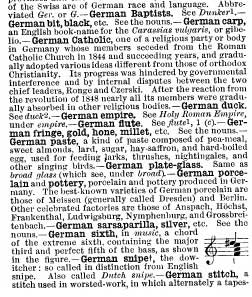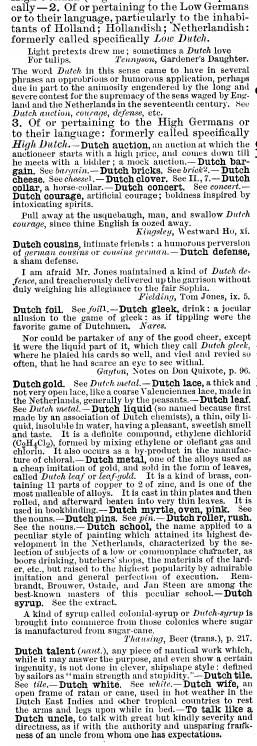Language Lounge
A Monthly Column for Word Lovers
Going Dutch
The Language Lounge removed to the Netherlands for a short break last month, with the specific mission of observing several of the various putative Dutch contributions to English on their native soil: Dutch courage, Dutch uncles, Dutch ovens, Dutch auctions, Dutch doors, Dutch hoes, and Dutch treats, to name a few.
The Dutch treats were a regular feature of our stay there but none of the others came to our attention, and so it got us thinking about European compounds in English — in which a European nation adjective supplies the first term — and in particular how it is that, among its larger and more illustrious neighbors, this rather small European country has achieved such impressive memic success, inspiring an eclectic and large contribution of English compound nouns.
This is not so many, you may think, but what strikes us about the Dutch list in comparison to other such compound sets in English dictionaries is that it achieves a fairly impressive length without including any of the three commonest categories into which these terms fall:
- compounds that refer to organisms, whether genus, species, or variety (Belgian sheepdog, Spanish moss)
- compounds that refer to historical phenomena (the Spanish Armada, the Irish Famine)
- compounds that denote foods (Irish soda bread, Hungarian goulash)
We often think of cultural influence as a corollary of economic power, which might lead you to think that, for influence in modern English, the main European contenders would be Germany, France, and Italy. The results are mixed. Nearly all compounds in English dictionaries in which Italian is the first term denote foods or organisms, and they are not so numerous. Italian sonnet is an exception to the rule. Most compounds beginning with Italian in use today are in fact deemed transparent and do not merit coverage in dictionaries (e.g., Italian restaurant/marble/sausage).
France has done very well in leaving its mark in English dictionaries: aside from the numerous food terms and the smattering of dog breeds, we still have French blue, French chalk, French door/window, French heel, French horn, French kiss, French knot, and French leave.
Germany, both today and historically, has prided itself on being an economic powerhouse, but it makes a rather poor showing in English dictionaries and in English generally — at least in so far as the adjective "German" is concerned. Aside from foods (German pancake) and animals (German shepherd), the only salient compounds today are German measles and German silver. It wasn't always so: the Century Dictionary, published in the US in the 1890s, listed several other German compounds (albeit several of them in one of the categories noted above):

Even in the 19th century, however, Dutch was already running well ahead of its Germanic neighbor in the compounds race:

Under the first quote above the editors of the Century note that
The word Dutch in this sense came to have in several phrases an opprobrious or humorous application, perhaps due in part to the animosity engendered by the long and severe contest for the supremacy of the seas waged by England and the Netherlands in the seventeenth century.
Or, the "Herring Wars" as they are sometimes called. The suggestion is not so much that Dutch economic and political power paved the way for its influence on the English lexicon, but rather that the resentment of that power did. The Oxford English Dictionary makes a similar observation in a curious and rather lumpy note that prefaces a number of "Dutch" compounds:
Characteristic of or attributed to the Dutch; often with an opprobrious or derisive application, largely due to the rivalry and enmity between the English and Dutch in the 17th c. Often with allusion to the drinking habits ascribed to the Dutch; also to the broad heavy figures attributed to the Netherlanders, or to their flat-bottomed vessels. Sometimes little more than [equivalent to] foreign, un-English.
"Broad heavy figures?" Is there anything disparaging that you can't say about the Dutch in an English dictionary?
This leads us to suspect that what really earns a compound an enduring place in the English lexicon is meaningful engagement with the English — which was of course abetted by geography in the case of the Dutch. This might also explain the wealth of "French" compounds in English, and probably also supplies a reason for two other large contributors: "Welsh" (it can be followed by black, corgi, onion, pony, poppy, rarebit, and terrier in English dictionaries), and "Scotch" (which shows up as the first term in asphodel, broom, broth, egg, fir, gale, kiss, pancake, pine, tape, terrier, thistle, whiskey, and woodcock). These lists, however, are rather dull: they're mostly plants, animals, and foods, the sorts of things that the English could have learned about or dubbed by simply taking a cross-border excursion. Scotch tape is an exception to this and also a sort of false positive on the list, being a trademark, an Americanism, and not readily available in Scotland. Completing the proximate geographic set, compounds beginning with Irish and Belgian also supply similarly colorless lists in English dictionaries, mostly of foods and animals.
It would seem then that in order to get a strong and persistent set of compounds in English, a country has not only to be nearby and engaged, but also has to get properly up the noses of the English, preferably over a period of centuries. We suspect that it has also helped the Dutch that they can be encapsulated in a monosyllable: English likes things short and snappy whenever possible. This might explain the dearth of compounds relating to European countries with ungainly adjectives: Portuguese man-of-war is the lone entry for that country in many dictionaries.
There is much to love about the Netherlands today — a country that is socially progressive, bicycle friendly, extremely well served by public transportation, solvent, and, as far as we know, not at odds with Britain about anything of importance — so it is interesting that so many of the pejorative compounds associated with the Dutch persist in English. We suspect that most people use them today without much knowledge of their origins, but perhaps the Dutch compounds are a cautionary tale: don't mess the arbiters of a leading world language — it may result in your being needlessly disparaged for centuries to come!


